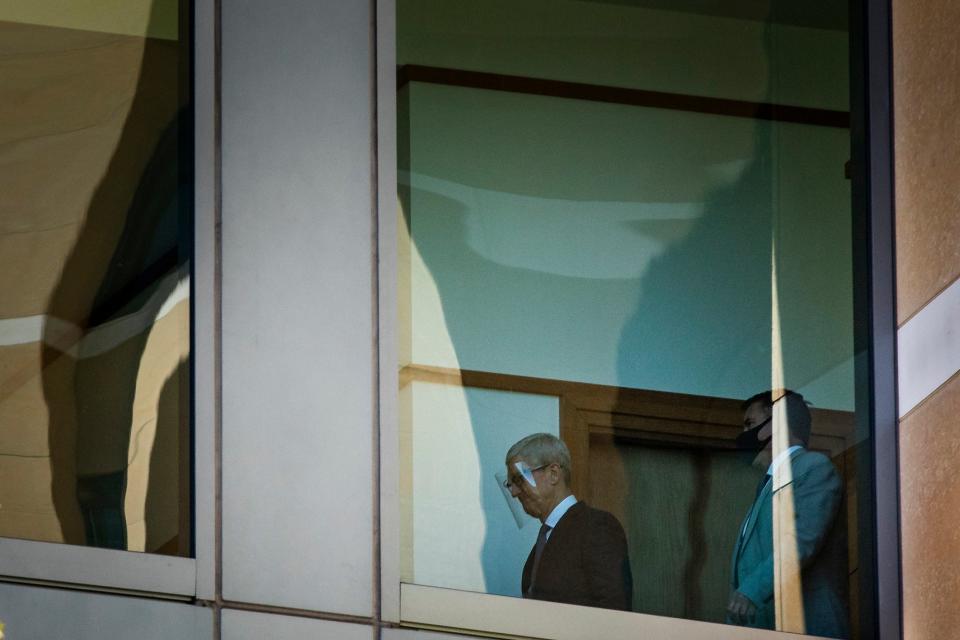Tim Cook defends Apple in Epic Games trial that could decide the future of iPhones

Tim Cook has defended Apple during tense questioning in its trial against Epic Games, which could decide the future of the iPhone and App Store.
The chief executive gave hours of evidence and tried to argue that Apple’s current policies – including taking 30 per cent of all digital purchases made through apps – should stay.
Epic wants the court to hand down a ruling that would require it to alter those policies, such as by allowing other kinds of purchase systems, or even letting developers add their own app stores to the iPhone in addition to Apple’s own.
Mr Cook on Friday told the court that threats to iPhone security and privacy required tight control of the App Store, which Fortnite maker Epic says is a monopoly that Apple illegally abuses.
The testimony constitutes Cook‘s most extensive public remarks on the App Store, which anchors Apple’s $53.8 billion services business, at a time when the company that once urged the world to ‘think different’ is criticized as too big and too powerful.
Epic has waged a public relations and legal campaign, parodying Apple’s iconic “1984” commercial and arguing that it acts anticompetitively by only allowing approved apps on the world’s 1 billion iPhones and forcing developers to use Apple’s in-app payment system which charges sales commissions of up to 30 per cent.
Cook under questioning said he had higher concerns about the phone than Mac computers. “You have a phone in your pocket most of the time and you want instant service. We felt both the use cases and the threat profile would eventually be much greater because of the number of iPhones on the market.”
Cook said an Apple document produced in the trial and showing a 78 per cent profit margin for the App Store did not account for several costs and was meant to show trends, not a true bottom line.
Epic has argued that the Mac is very safe without Apple’s App Store review and that most of the privacy and security benefits come from the operating system, not App Store rules.
The maker of Fortnite, which pits players against in each other in an animated “Battle Royale” fight to the last survivor, is led by CEO TimSweeney, who has reveled in the public opportunity to take on Apple.
Sweeney two weeks ago kicked off the trial as Epic’s first witness, using his time on the stand to argue that “Fortnite” has become a place for players to gather in a virtual world he calls the “metaverse” and that Apple is unfairly demanding an outsized cut of profits for providing simple payment processing technology.
On Friday, Sweeney, who has attended every day of the trial as a corporate representative for Epic, listened to Cook‘s testimony, looking down at a rubber band he stretched and twirled between his fingers while making notes.
The antitrust trial at a federal courthouse in Oakland, California, comes as Apple faces a chorus of criticism from app makers including music service Spotify Technology, European regulators and U.S. politicians including who say the $2 trillion company tries to squash small competition.
In the past, Cook fielded a handful of questions about the App Store while testifying before U.S. lawmakers last year, but he has stayed mostly silent as lawmakers grilled the chiefs of Google and Facebook.
Apple has sought to persuade Judge Yvonne Gonzalez Rogers that its rules for developers are aimed at keeping its customers’ information private and safe from malware. Cook on Friday said developer fees were necessary to support the App Store.
In the US, lawmakers such as Senator Amy Klobuchar who are contemplating new antitrust laws are likely to comb through the records generated in the Epic case.
“This case has always been part of a bigger narrative rather than something that’s going to decide the issue on its own,” said John Bergmayer, legal director at consumer advocacy group Public Knowledge.
Additional reporting by Reuters
Read More
Prince Harry compares Meghan racism to Diana and Dodi
Prince Harry’s drinking and the signs you need to re-evaluate your own relationship with alcohol

 Yahoo Finance
Yahoo Finance 